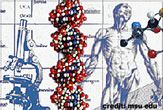Voice of Reason: Licensing Naturopaths May Be Hazardous to Your Health

Thirteen states and the District of Columbia now license naturopaths as primary healthcare providers and lobbying campaigns are underway to persuade lawmakers in other states to grant naturopaths rights as primary healthcare providers.
Many health authorities oppose licensing naturopaths because, they say, it will lower educational and professional standards and put the public's health at risk. They point to the unscientific, often anti-scientific attitudes of naturopaths and warn of the danger of further lowering safeguards and standards that were established to protect the public from the care of unqualified healers.
While proponents argue that licensing naturopaths would protect the public by establishing educational and practice standards for naturopaths, critics say that argument makes no more sense that claiming the establishment of educational standards for astrologers would make horoscopes more accurate.
Naturopathy is no more based on science than astrology, say experts like Kimball C. Atwood, IV, M.D., who was an author of the Minority Report on Naturopathy to the Massachusetts Legislature (SRAM. 2004;8[1]:18-37).
Naturopathy is a hodgepodge of alternative healthcare practices that are said to boost the body's natural healing powers, through "natural," non-medical means, he says. Most practices of naturopaths are based on mystical and pseudoscientific beliefs. Many of their diagnostic procedures, such as hair analysis and iridology, have been scientifically discredited -- as have many of their treatments, such as homeopathy, "cranial osteopathy," coffee enemas, and chelation therapy for coronary artery disease. Despite the absence of scientific evidence that any of these work, naturopathic doctors adhere to these practices with unquestioning faith.
For example, many naturopathic doctors recommend that parents give their children homeopathic preparations instead of vaccinating them against diphtheria, whooping cough, tetanus, measles, and other crippling and deadly infectious diseases. They exaggerate the risks of vaccines and often falsely claim vaccines don't really work. With relatively few exceptions, the only children still stricken today by these ancient scourges are those not vaccinated.
One survey of naturopathic doctors in Massachusetts conducted by investigators from Children's Hospital in Boston found only 20 percent of the naturopaths surveyed said they would recommend to parents that they vaccinate their children. And only 40 percent said they would refer a 2-week-old infant with a 101 degree F. temperature for medical care.
Sign up for the Live Science daily newsletter now
Get the world’s most fascinating discoveries delivered straight to your inbox.
Naturopaths also steer parents away from antibiotics that could prevent their children from developing scarlet and rheumatic fever -- once another great scourge of children. And they sell unproven remedies to patients at risk for heart disease and strokes instead of recommending drugs that have been proven to control high blood pressure and high cholesterol that cannot be controlled by exercise and diet.
Naturopaths also may endanger their patients because they lack the clinical training that is required of all medical doctors, Dr. Atwood says. While medical school graduates are required to undergo one or more years of intensive clinical training under the supervision of experienced physicians, naturopaths usually are allowed to practice right after graduation without an internship or other extensive clinical training.
Politics vs. Science
Despite the lack of scientific evidence for the safety and efficacy of naturopathy, legislatures in 13 states have decided to licensed naturopaths. Those states include, Alaska, Arizona, California, Connecticut, Hawaii, Kansas, Maine, Montana, New Hampshire, Oregon, Utah, Vermont, and Washington. Naturopathic doctors are also licensed in the District of Columbia, Puerto Rico and the U.S. Virgin Islands, and legislators in New York, Colorado, and other states have now sponsoring similar licensing bills
The American Association of Naturopathic Physicians (AANP) states that "naturopathic medicine has its own unique body of knowledge, evolved and refined for centuries" and is "effective in treating all health problems, whether acute or chronic." In addition, many are also trained in modern science, their advocates say, pointing to the curricula of the four naturopathic medical schools in the United States.
These schools provide their students with a 4-year curriculum that includes the same basic sciences taught in medical schools, along side the special instructions in "holistic and nontoxic approaches to therapy with a strong emphasis on disease prevention and optimizing wellness."
However, their critics argue, what naturopaths learn has little to do with either basic or clinical science. The basic core of naturopathy rests on occultism and pseudoscientific beliefs that are resistant to modification from scientific discoveries.
Perhaps the most distinguishing difference between a medical doctor and a naturopathic healer is that if you show a medical doctor scientific evidence that a drug is unsafe or doesn't work, he or she will stop using it. With few exceptions, naturopathic doctors base their treatments are seldom if ever swayed by scientific evidence.
In 1968, naturopaths asked the federal government to recognize their treatments for Medicare reimbursement, and this is what the U.S. Department of Health Education and Welfare concluded:
"Naturopathic theory and practice are not based on the body of basic knowledge related to health, disease, and healthcare that has been widely accepted by the scientific community. Moreover, irrespective of its theory, the scope and quality of naturopathic education do not prepare the practitioner to make an adequate diagnosis and provide appropriate treatment."
Little appears to have changed over the past four decades to bring naturopathy into the 21st century. And until naturopaths embrace evidence-based medicine and abandon their mystical and anti-scientific methods, they will endanger the public if allowed to practice medicine as primary care givers.
Establishing standards for those who use pseudoscientific and mystical practices will not transform them into competent physicians capable of practicing sound, evidence-based medicine. As Dr. Edzard Ernst, director of Complementary Medicine at the University of Exeter in England, warned, those "who believe that regulation is a substitute for evidence will find that even the most meticulous regulation of nonsense must still result in nonsense."
